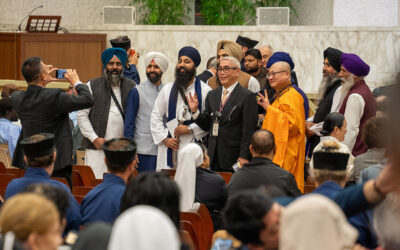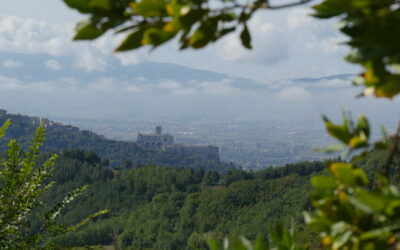 “It is not a simple tuition class, or a mere opportunity to work. Udisha is much more, a real and true point of reference for children, families and entire communities.” This is what Susanna Svaluto Moreolo wrote, a young Italian Volunteer, the first one from Italy to lend her services to the project of the Focolare Movement in Goregaon, one of the slum areas of Mumbai, 400,000 inhabitants, 40 minutes by train from the city centre.
“It is not a simple tuition class, or a mere opportunity to work. Udisha is much more, a real and true point of reference for children, families and entire communities.” This is what Susanna Svaluto Moreolo wrote, a young Italian Volunteer, the first one from Italy to lend her services to the project of the Focolare Movement in Goregaon, one of the slum areas of Mumbai, 400,000 inhabitants, 40 minutes by train from the city centre.
Udisha, in urdu “the ray of light that brings a new dawn” takes in more than 100 children, teens (from 4 to 22 years old) and many mothers every year: there are 60 of them inserted in the micro-credit project. It is a project born from and based on the spirituality of unity, according to the conviction of Chiara Lubich that the greatest power for social transformation lies in the Gospel lived. Concretely it involves activities after school, counseling, occupational therapy for children and teens; contributions are made to pay for school fees; production and sale of bags for the activities of micro-credit; days of conviviality and meetings organized for the parents, and financial support for the families.
«What impressed me – continued Susanna, a student – is the awareness, above all on the part of the teens, of the opportunity that this project offers them as students and as persons and, consequently, their commitment and active participation in the project itself. The teens find in Udisha a real and true second home, people in whom to confide in and on whom they know that they can rely on for help. Most importantly, in this regard, is the presence of a counselor who provides psycho-educative support for the teens and parents.
 The volunteer workers carry out their daily life in Udisha, and the impression one has is that the project takes on the «central role for those who are part of it. One can grasp this from the way the children work in groups among them and on how the older ones are responsible for the younger ones, from the mothers who come to Udisha at least three times a day to accompany the children, bring them their lunch and take them back, and then to return once again to work in the project of bag-making that involves them directly. The fact that among the teachers of the tuition class after school there are also the young girls who in tha past were the beneficiaries of the project and continue to be a part of it as volunteers, is quite significant.”
The volunteer workers carry out their daily life in Udisha, and the impression one has is that the project takes on the «central role for those who are part of it. One can grasp this from the way the children work in groups among them and on how the older ones are responsible for the younger ones, from the mothers who come to Udisha at least three times a day to accompany the children, bring them their lunch and take them back, and then to return once again to work in the project of bag-making that involves them directly. The fact that among the teachers of the tuition class after school there are also the young girls who in tha past were the beneficiaries of the project and continue to be a part of it as volunteers, is quite significant.”
An experience wherein each one can put at the service of the others that which he or she does the best, in Susanna’s case for example, it was dance: “I had the chance to teach dancing both to the teens and to the mothers, preparing them for a performance on the occasion of the feast of the independence. This involved me in a special way because it allowed me to discuss with these women, who agreed with enthusiasm to the activity, making me understand the importance of creating moments of relaxation, that allows them to pass the time and to escape, even just for awhile, from their daily routine.”
An impression before leaving the Indian subcontinent? “I believe that the experience in Udisha represents a very beautiful opportunity because it allows one to fully life the Indian reality: the hospitality, the dignity, the food, the religious aspect and the reciprocal respect for the different religions and cultures, the rituals, the weekends spent with the Hindu families of Udisha… with regards to the fear of all these aspects that I had before leaving, this experience made me forget then all.”




0 Comments